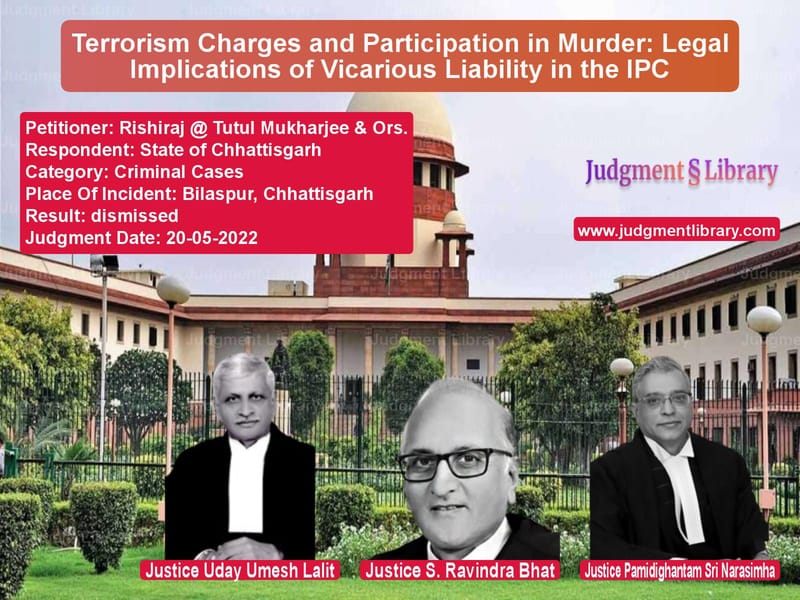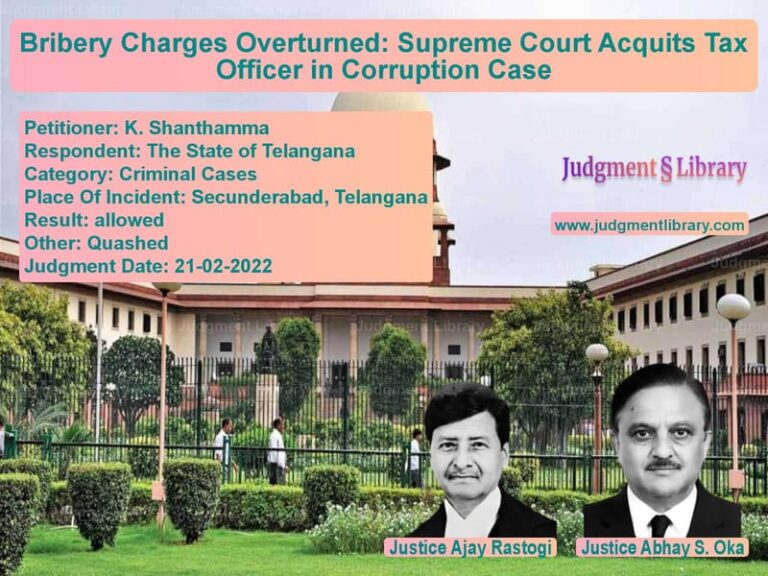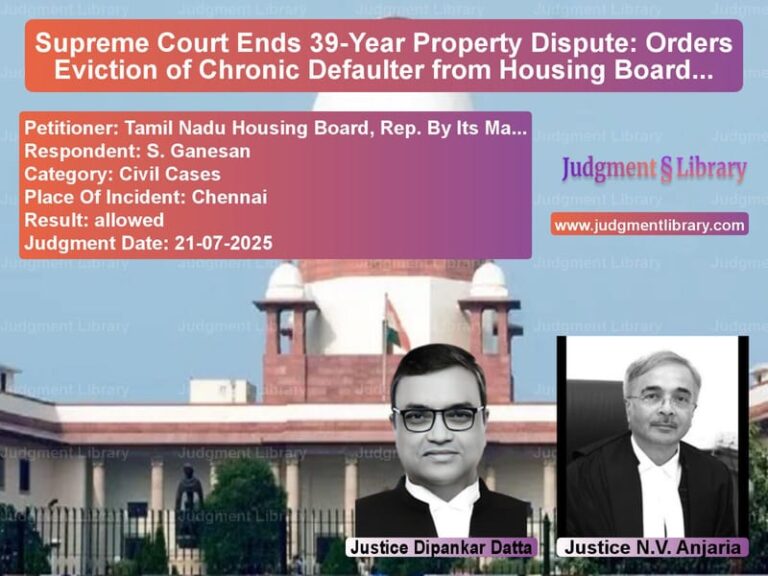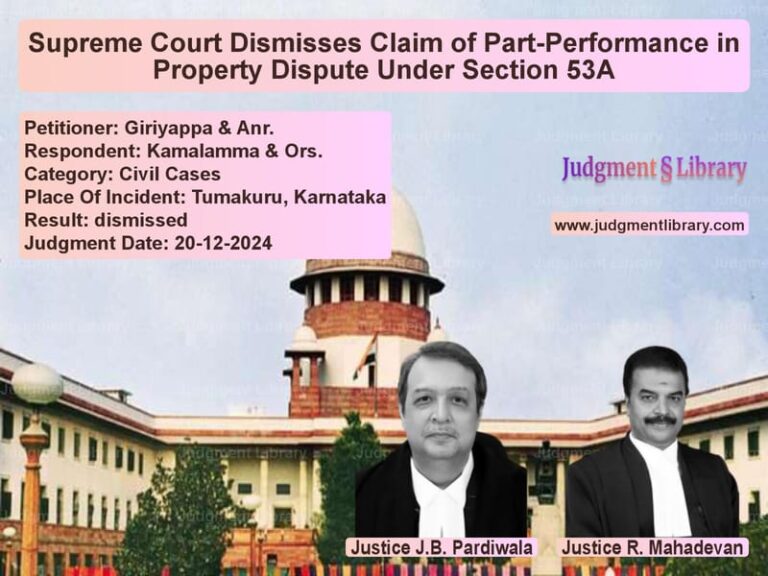Terrorism Charges and Participation in Murder: Legal Implications of Vicarious Liability in the IPC
This case concerns the appeal filed by five individuals, Rishiraj @ Tutul Mukharjee, Samrat @ Laltu Mukharjee, Vijay @ Hallo Jaiswal, Hani @ Koustubh Samdariya, and Vijay @ Hallo Jaiswal, who were convicted under Section 302 read with Section 149 of the Indian Penal Code (IPC) for their involvement in the murders of two individuals, Gudda Sonkar and Nanka Ghore. The appellants challenge their conviction based on the charges of vicarious liability and participation in the crime. The case arose from a violent altercation that turned fatal when multiple gunshots were fired by the accused during a scuffle outside a hotel.
Petitioner’s Arguments
The appellants, represented by their counsel, argued that their involvement in the crime was limited to being present at the scene of the incident, and that they did not participate in the actual firing of the gunshots that killed the victims. The appellants contended that they were not directly involved in the act of murder and that their participation was limited to an oral altercation, where they allegedly exhorted the primary assailants, Jai @ Gudda Jaiswal and Manoj Aggarwal, to kill the victims. The appellants claimed that their actions should not be construed as vicarious liability for the murders committed by the other accused.
The appellants argued that under Section 149 of the IPC, for vicarious liability to apply, the accused must be part of an unlawful assembly with a common object. However, the appellants maintained that they had not shared the common object of committing murder. They argued that there was no evidence to suggest that they had the intention to kill the victims, and thus they should not be convicted under Section 302 read with Section 149 of the IPC. The appellants also pointed out that there were discrepancies in the eyewitness accounts, which they claimed could not be relied upon to establish their participation in the crime.
Respondent’s Arguments
The respondent, represented by the prosecution, argued that the appellants were not mere bystanders but active participants in the crime. The prosecution relied heavily on the eyewitness testimony, which indicated that the appellants had been present at the scene, engaged in the scuffle, and had actively participated in the subsequent exhortation to kill the victims. The prosecution argued that the appellants’ role was not limited to merely witnessing the incident but extended to encouraging the crime and ensuring its successful execution.
The respondent further contended that the appellants’ actions in the moments leading up to and following the shooting were crucial in establishing their guilt. According to the prosecution, the exhortations made by the appellants, urging the primary assailants to kill the victims, demonstrated their involvement in the unlawful assembly and their shared intention to commit murder. The respondent emphasized that the appellants’ participation in the scuffle, coupled with their encouragement to commit murder, was enough to convict them under Section 302 read with Section 149 of the IPC.
Court’s Analysis and Conclusion
The Supreme Court reviewed the arguments presented by both parties and carefully analyzed the application of Section 149 of the IPC, which deals with vicarious liability in cases of unlawful assembly. The Court examined the eyewitness testimony, which consistently placed the appellants at the scene of the crime and described their role in the scuffle and the subsequent exhortation to kill the victims. The Court noted that the appellants were not passive observers but were actively involved in the events that led to the deaths of Gudda Sonkar and Nanka Ghore.
The Court also emphasized that under Section 149 of the IPC, the presence of the appellants in an unlawful assembly with a common object to commit murder was sufficient to establish their liability for the murder, even if they did not directly commit the act of killing. The Court found that the appellants’ exhortation to kill the victims, coupled with their participation in the scuffle, demonstrated their shared intention to commit murder. The Court ruled that the appellants’ actions were inextricably linked to the crime and that their vicarious liability under Section 149 was well established.
The Court rejected the appellants’ argument that they had no common object to commit murder, noting that their presence at the scene, their participation in the scuffle, and their exhortations to kill the victims were clear indicators of their shared intention to cause harm. The Court also found that the eyewitness accounts were credible and consistent, and there was no compelling reason to doubt their testimony. The Court concluded that the appellants had been rightly convicted under Section 302 read with Section 149 of the IPC and affirmed their guilt.
Final Decision
The Supreme Court dismissed the appeals filed by the appellants, affirming the conviction of the appellants under Section 302 read with Section 149 of the IPC for their involvement in the murders of Gudda Sonkar and Nanka Ghore. The Court held that the appellants’ actions, including their presence at the scene, their participation in the scuffle, and their exhortation to kill, established their vicarious liability for the murders. The Court emphasized that the appellants’ conduct clearly indicated their shared intention to commit murder, and their conviction under the IPC was justified. The appeals were dismissed, and the conviction was upheld.
Petitioner Name: Rishiraj @ Tutul Mukharjee & Ors..Respondent Name: State of Chhattisgarh.Judgment By: Justice Uday Umesh Lalit, Justice S. Ravindra Bhat, Justice Pamidighantam Sri Narasimha.Place Of Incident: Bilaspur, Chhattisgarh.Judgment Date: 20-05-2022.
Don’t miss out on the full details! Download the complete judgment in PDF format below and gain valuable insights instantly!
Download Judgment: rishiraj-@-tutul-muk-vs-state-of-chhattisgar-supreme-court-of-india-judgment-dated-20-05-2022.pdf
Directly Download Judgment: Directly download this Judgment
See all petitions in Murder Cases
See all petitions in Bail and Anticipatory Bail
See all petitions in Terrorist Activities
See all petitions in Judgment by Uday Umesh Lalit
See all petitions in Judgment by S Ravindra Bhat
See all petitions in Judgment by P.S. Narasimha
See all petitions in dismissed
See all petitions in supreme court of India judgments May 2022
See all petitions in 2022 judgments
See all posts in Criminal Cases Category
See all allowed petitions in Criminal Cases Category
See all Dismissed petitions in Criminal Cases Category
See all partially allowed petitions in Criminal Cases Category







